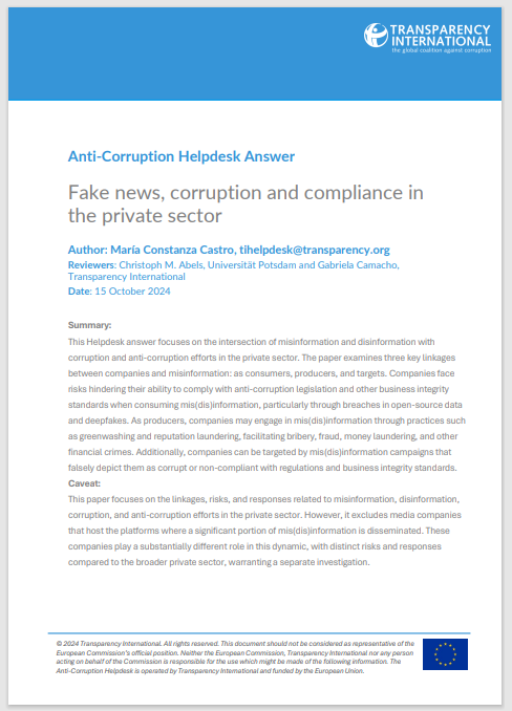
This Anti-Corruption Helpdesk brief was produced in response to a query from one of Transparency International’s national chapters. The Anti-Corruption Helpdesk is operated by Transparency International and funded by the European Union.
Query
How do disinformation, misinformation, and fake news risks affect companies, and what steps can they take to mitigate these risks, protect their reputation, and ensure regulatory compliance? Additionally, how are the EU and its member states addressing this issue? What is the link between these risks and compliance with anti-corruption, governance, and transparency regulations, and how might they impact the reputation of publicly traded companies? What strategies or initiatives can companies adopt to combat these risks?
Summary
This Helpdesk answer focuses on the intersection of misinformation and disinformation with corruption and anti-corruption efforts in the private sector. The paper examines three key linkages between companies and misinformation: as consumers, producers, and targets. Companies face risks hindering their ability to comply with anti-corruption legislation and other business integrity standards when consuming mis(dis)information, particularly through breaches in open-source data and deepfakes. As producers, companies may engage in mis(dis)information through practices such as greenwashing and reputation laundering, facilitating bribery, fraud, money laundering, and other financial crimes. Additionally, companies can be targeted by mis(dis)information campaigns that falsely depict them as corrupt or non-compliant with regulations and business integrity standard.
Main points
- Misinformation refers to false information shared without intent to mislead or cause harm, whereas disinformation is shared with the intention to deceive. The term "fake news" is often used to refer to both. Studies show that false information is 70% more likely to be shared than the truth, making (mis)disinformation growing concerns in both the public and private sectors.
- Compliance procedures, essential for companies to meet regulatory requirements and prevent corruption, rely heavily on accurate and reliable information. When misled by (mis)disinformation, companies may overlook corruption risks, exposing them to legal consequences such as fines or corporate liability, as well as significant business losses.
- Companies may also be tempted to produce disinformation to improve their image through practices like greenwashing, or to enhance a client's image through reputation laundering. This type of corporate disinformation can enable corruption, money laundering, and other financial crimes.
- While corruption appears in only a small fraction (less than 1%) of corporate fake news, (mis)disinformation about unethical lobbying and non-compliance with regulations accounts for almost 15% of the fake news targeting companies.
- Companies can mitigate the risks of (mis)disinformation through capacity building (such as improving detection of false information), partnerships (with factchecking organisations or PR firms specialising in responding to misinformation), and strengthened internal procedures (like enhanced verification protocols).
- Government responses to (mis)disinformation, such as the Digital Services Act in the EU, aim to create a cleaner information environment, reducing the risks for companies to consume, produce, or be targeted by corporate fake news.
Authors
María Constanza Castro Orduña, [email protected]
Reviewed by
Christoph M. Abels (Universität Potsdam) and Gabriela Camacho (TI)
Date
21/10/2024

